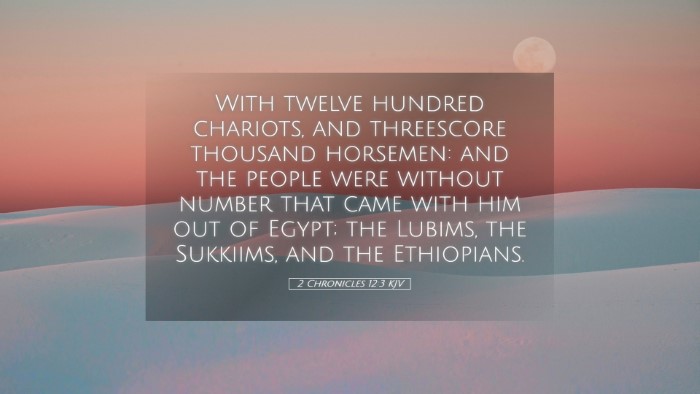Commentary on 2 Chronicles 12:3
Verse: "With twelve hundred chariots, and threescore thousand horsemen: and the people were without number that came with him out of Egypt; the Lubims, the Sukkiims, and the Ethiopians." (2 Chronicles 12:3)
Introduction
This verse from 2 Chronicles presents a historical overview of Shishak's invasion of Judah, emphasizing the military might he deployed against King Rehoboam. This event is pivotal as it underscores the consequences of turning away from God and demonstrates the significance of divine protection for the people of Israel. This commentary aims to unpack the implications of this verse by weaving insights from celebrated public domain commentaries.
Historical Context
The invasion of Shishak, an Egyptian Pharaoh, is an important moment that illustrates both the geopolitical dynamics of the ancient Near East and the spiritual state of Judah at the time. Matthew Henry notes that this Egyptian king was the son of Solomon, making the invader a familiar figure to the nation. The military strength highlighted in this verse indicates Shishak's power and the precarious position of Rehoboam’s kingdom following Solomon's death.
Military Forces Deployed
-
Chariots and Horsemen: The text specifies that Shishak brought "twelve hundred chariots and threescore thousand horsemen." Albert Barnes elucidates that the number of chariots alone indicates an immense military organization—an unparalleled force meant to intimidate and overwhelm the fledgling kingdom of Rehoboam.
-
Numerous Troops: Additionally, it is noted that Shishak's forces were "without number," suggesting a large and diverse coalition. Adam Clarke comments on the inclusion of "the Lubims, the Sukkiims, and the Ethiopians," identifying them as allies possibly motivated by both greed and a desire for revenge against Israel for historical grievances.
Theological Implications
This verse serves to remind readers of the covenantal relationship between God and His people. Rehoboam's reign was marked by unfaithfulness to God's commandments, leading to an eventual spiritual decline. Matthew Henry suggests that this attack is a divine response to Judah's idolatry, showing that when the people forsake God, they invite calamity upon themselves.
Rehoboam’s Leadership
The character of King Rehoboam is critical in understanding this passage. His decisions leading up to and during his reign displayed a disregard for the wisdom of his father, Solomon, and particularly for divine guidance, as noted by Barnes. His failure to consult the elders and heed wise counsel exemplifies a common vulnerability in leadership—where pride and inexperience can lead to downfall.
Divine Protection and Judgment
Throughout the Old Testament, God’s protective hand over Israel is a recurring theme. However, as Clarke points out, when Israel turns away from God, His protection is lifted, allowing adversaries to act freely. The invasion by Shishak illustrates both the loss of protection due to sin and the inevitable consequences of turning away from God.
Lessons for Today
-
The Importance of Faithfulness: The story of Shishak's invasion is a timeless reminder that faithfulness to God is crucial for individuals and nations alike. Rehoboam's lapse into sin led Judah into a period of turmoil, prompting a call to present-day leaders and faithful individuals to pursue righteousness and integrity.
-
Awareness of Spiritual Warfare: The grandeur of Shishak's army parallels the spiritual battles believers face today. The enemy does not attack with mere physical might but instigates spiritual complacency. Thus, vigilance in prayer and commitment to God's commands remains pertinent for believers seeking to fortify their lives against similar challenges.
-
Seeking Counsel: The importance of seeking wise counsel in leadership cannot be overstated. Just as Rehoboam dismissed the wise advice of elders, contemporary leaders must remain humble and open to guidance that aligns with biblical teachings.
Conclusion
2 Chronicles 12:3 provides profound insights not only into the historical backdrop of Shishak’s invasion but also elucidates critical spiritual truths applicable to believers today. The interplay between divine judgment, leadership failures, and the need for repentance offers a clarion call for reflection—encouraging all readers to remain steadfast in their faith, to seek God earnestly, and to heed divine warnings. Ultimately, the narrative reinforces the understanding that the strength and safety of any leader, community, or nation lie firmly in their relationship with God.


